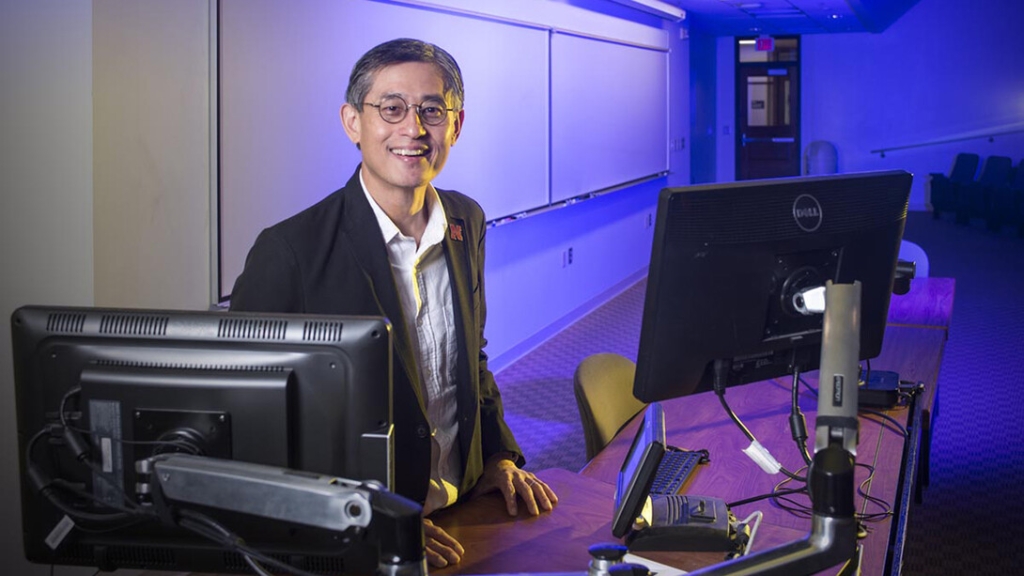Victoria Grdina, December 6, 2024
Soh, Husker faculty training next generation of computer science teachers
Nebraska educators are preparing tomorrow’s teachers for today’s technology-driven learning landscape by integrating more computer science curriculum into the courses they’re taking now and will teach in the future.
With a new $1,999,675 grant from the National Science Foundation, an interdisciplinary team of University of Nebraska–Lincoln faculty, including Leen-Kiat Soh, Charles Bessey Professor in the School of Computing, aims to address a growing shortage of computer science teachers by increasing the number qualified to teach computer science at the K-12 level.
The project, titled “Computer Science: Focusing on Undergraduate Pre-Service Teachers, with Unified Research, Ecosystems, and Structures (CS FUTURES),” will focus on training pre-service teachers — or undergraduate students studying to become teachers — to teach computer science as part of their initial teaching assignment, offering new primary and supplementary endorsements in the subject area.
“We don’t have enough teachers, and most teachers that we train are math or business teachers, not dedicated computer science teachers,” Soh said. “We know there is a shortage in other subject matters as well, and, after all, computer science is a relatively new subject at the K-12 level, so we will recruit students to become computer science teachers, but we’re also open to students becoming teachers in other subject matters and taking some computer science courses, learning to teach it, and integrating it into science and math.”
Soh will serve as the principal investigator on the project alongside Guy Trainin, professor in the Department of Teaching, Learning and Teacher Education; Gwen Nugent, professor emerita in Children, Youth, Families and Schools; Wendy Smith, professor and director of the Center for Science, Mathematics and Computer Education; and Brian Dorn, associate professor of computer science at the University of Nebraska at Omaha.
Members of the team previously collaborated on another NSF-funded computer science teaching initiative, “CSForAll: Adapt, Implement, and Research at Nebraska (AIR@NE),” which focused on training in-service teachers to teach computer science. CS FUTURES will build on the principles and foundation initially laid by AIR@NE.
“AIR@NE was for teachers who had been teaching for years already, were assigned to teach computer science, and had to learn how to teach it,” Soh said. “This project, instead, will focus on pre-service teachers, who are still undergraduate students and don’t have any certifications yet. They want to become K-12 teachers, and they can become K-12 computer science teachers, or at least become able to teach computer science if they want to become a science teacher.”
While the primary goals of CS FUTURES will be to establish a computer science teaching endorsement and design curriculum and courses for both undergraduate and K-12 students, Soh envisions building an end-to-end ecosystem of educational support. Through extensive research, the team will explore best practices and methods for recruiting, training, educating and engaging pre-service teachers. Their findings will guide them in the development of sustainable infrastructures and instructional materials.
To ensure their models will be suited to a variety of classroom settings and teaching pathways, they’ll collaborate with educators and leaders at Southeast Community College, Metropolitan Community College, Western Nebraska Community College, Northeast Community College and Central Community College. They’ll also partner with other state institutions and local industry — such as the Nebraska Department of Education and the Nebraska Tech Collaborative — to form a consortium that can provide continuing support and ongoing education throughout their careers.
“We want to make sure there’s an endorsement certification and process. We want to make sure there are pathways for two-year to four-year colleges. We want to have a communal practice of support once they become teachers,” Soh said. “We have long-term development in mind, and hopefully what’s sustained in the whole process is the community that goes beyond the end of the project.”
Soh said not only will increasing the number of computer science teachers improve the educational experience for K-12 students, but it would also expand options for many schools across the state, particularly in western Nebraska.
“In rural areas, some schools lack resources to support computer science, so that could mean there’s only one computer science course, and the experience might be reduced as a result,” Soh said. “We’re exploring if it’s possible to have some sort of a remote or distance program that we can teach the students’ teachers so that in the future, they can be more responsible, support each other better and teach more courses.”
Although CS FUTURES will focus on improving Nebraska computer science education, Soh believes the project will have a positive effect extending far beyond the state.
“I’m looking forward to making a long-lasting impact on computer science education,” Soh said. “And not just getting more teachers to teach computer science, but also the research behind it. The research side will allow more people to continue to not only improve how we teach computer science, but also how we teach teachers to teach computer science.”






